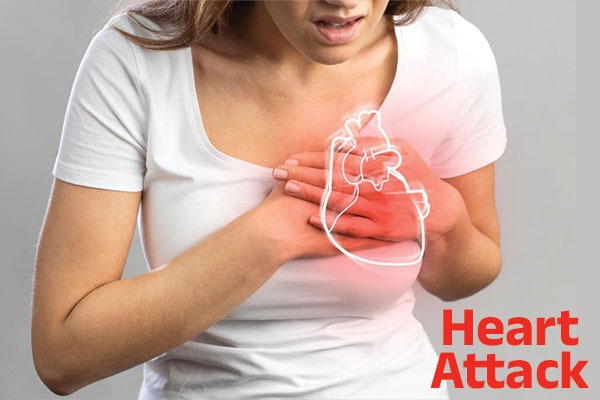
Heart attacks are becoming as common a disease as the common cold.
A heart attack, also called a myocardial infarction, occurs when a part of the heart muscle does notreceive enough blood.
The more time that goes by without treatment to restore blood flow, the greater the damage to the heart muscle.
Coronary artery disease (CAD)
Coronary artery disease (CAD) is the primary cause of heart attacks. A less common reason is a severe spasm, or sudden contraction, of a coronary artery that cansuddenly stop blood flow to the heart muscle.
Symptoms of Heart attack
The major symptoms of a heart attack are chest pain or discomfort. Most heart attacks comprise discomfort in the centre or left side of the chest that lasts for more than a few minutes or that is spasmatici.e., goes away and comes back. The discomfort cis akin to an uncomfortable pressure, squeezing, fullness, or pain.
Another symptom can be feeling weak, light-headed, or faint orbreaking out into a cold sweat. Pain or discomfort in the jaw, neck, or back, or discomfort in one or both arms or shoulders.
Shortness of breath is yet another symptom or warning sign. This often is accompanied with discomfort in chest, but shortness of breath also can happen before chest discomfort.
Other symptoms of an impending heart attack might include unusual or unexplained tiredness and nausea or vomiting.
Risk Factors of Heart attacks
Several health conditions, your lifestyle, and your age and family history can increase your risk for heart disease and heart attack.
Some risk factors cannot be controlled, such as your age or family history. But you can take steps to lower your risk by changing the factors you can control.
If you’ve had a heart attack, your heart may be damaged. This could affect your heart’s rhythm and its ability to pump blood to the rest of the body.
You may also be at risk for another heart attack or conditions such as stroke, kidney disorders, and peripheral arterial disease (PAD).
Heal your heart at Dhage Healthcare, Protective Ayurved Centre.
If you fall in any of these categories, It would be advisable to visit a doctor to assess the possibilities of getting a heart ailment. For those who prefer the natural route of treatment, there’s no place better than Dhage Healthcare, Protective Ayurved Centre where Pune’s best cardiologist and cardiologist surgeon, Dr.Santosh Dhage can review your case and suggest the ideal ayurvedic preventive measures for you.
Furthermore,those who have suffered a heart attack need proper cardiac rehabilitation to lessen yourodds of having health problems in the future. Following these basic.steps---Physical activity needs to be monitored. Apportion your physical activity in consultation with your cardiologist. Lifestyle changes have to be made ;A healthier diet, quitting smoking, and managing stress—in addition to taking prescribed medicines are some of the precautionary measures one can take to avoid heart attacks.
Cardiac treatment is an imperative program for anyone recovering from a heart attack, heart failure, or any other heart issues that required medical care. Cardiac treatment needs to be a supervised program that includes a holistic approach to treating heart ailments. Visit the best cardiologist inPune at Dhage Healthcare, Protective Ayurved Centre for education about healthy living, including healthy eating, taking medicine as prescribed, and ways to help you quit smoking. The team of people at Dhage Healthcare, Protective Ayurved Centrewill help you through cardiac rehab, the natural surgery-less, ayurvedic way!
Treament for Heart Attack
Heart attack treatmentcan have many health benefits in both the short and long term. Strengthening your heart and body after a heart attack, relieving symptoms of heart problems, such as chest pain. Adopting healthier habits such as getting more physical activity, quitting smoking, and eating a heart-healthy diet. A nutritionist or dietitian may work with you to help you limit foods with unhealthy fats and eat more fruits and vegetables that are high in vitamins, minerals, and Fiber. Reducing stress, keeping your spirits high as depression is likely to kick in post a heart attack.